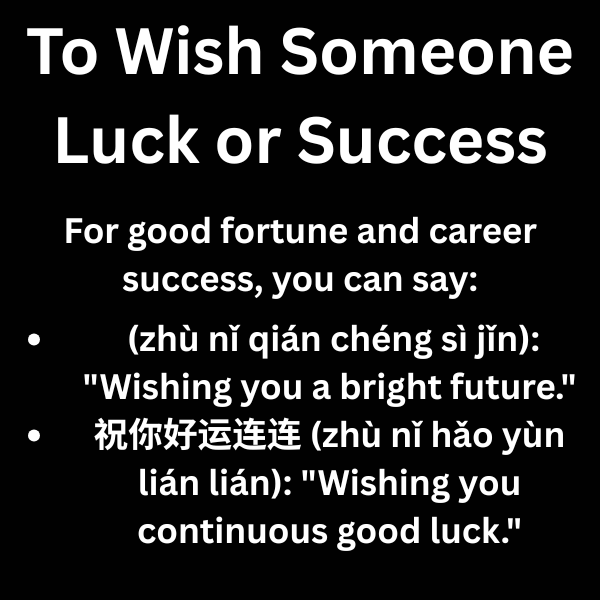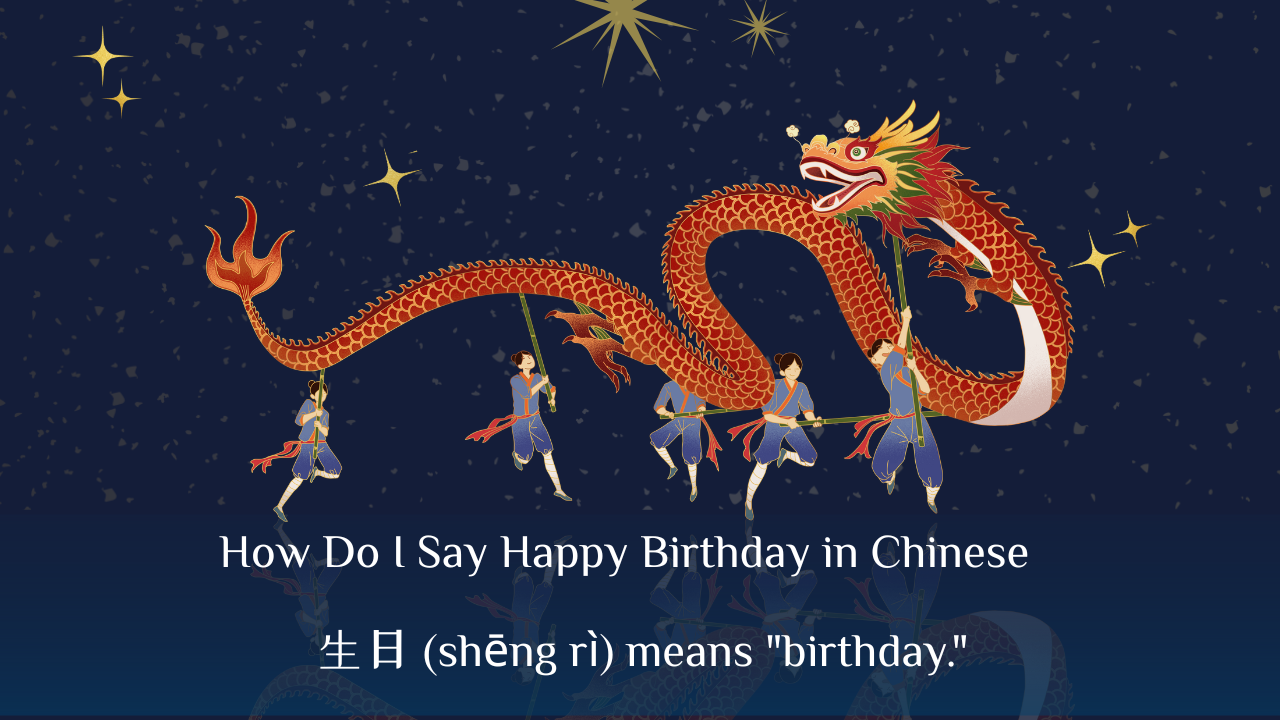Birthdays are universal, yet the way they are celebrated varies across cultures. If you have Chinese-speaking friends, family, or colleagues, learning how to say “Happy Birthday” in Chinese is a thoughtful and meaningful way to join in their celebration. Mandarin Chinese not only offers a traditional phrase for wishing someone a happy birthday but also includes several variations to suit different contexts and relationships. Plus, Chinese birthday traditions add unique cultural charm to the festivities.
By the end of this blog, you’ll know how to say “Happy Birthday” in Mandarin, explore alternative phrases, and even learn a bit about traditional Chinese birthday customs.
The Traditional Way to Say Happy Birthday in Chinese
The most common way to say “Happy Birthday” in Mandarin is 生日快乐 (shēng rì kuài lè). This phrase is widely used in Chinese-speaking regions and is suitable for nearly any context.
Here’s a breakdown of the phrase:
- 生日 (shēng rì) means “birthday.”
- 生 (shēng) translates to “birth” or “to give birth.”
- 日 (rì) means “day.”
- 快乐 (kuài lè) means “happy.”
- 快 (kuài) translates to “fast” or “quick,” but in this context, it signifies “happiness.”
- 乐 (lè) translates to “joy” or “pleasure.”
Put together, 生日快乐 literally means “birthday happiness” or simply “Happy Birthday.”
When to Use “生日快乐”
You can use 生日快乐 with almost everyone, including friends, family, colleagues, and even acquaintances. The phrase is neutral and universally understood, making it perfect for any casual or formal situation.
Alternative Ways to Wish Happy Birthday in Chinese
Depending on the context, relationship, or level of formality, there are other ways to express birthday wishes in Chinese. Here are some examples:
For Elders or Seniors
When wishing an older person a happy birthday, you may want to show more respect or invoke blessings for longevity. Here are two common phrases:
- 祝您生日快乐 (zhù nín shēng rì kuài lè): This is a polite and respectful way to say “Happy Birthday to you.” The word 您 (nín) is a formal way to say “you” in Chinese, appropriate for elders or authority figures.
- 祝您福如东海,寿比南山 (zhù nín fú rú dōng hǎi, shòu bǐ nán shān): This translates to “May your happiness be as vast as the East Sea, and may your longevity match the South Mountain.” This poetic phrase is used to wish elders a long and prosperous life.
To Wish Someone Luck or Success

For good fortune and career success, you can say:
- 祝你前程似锦 (zhù nǐ qián chéng sì jǐn): “Wishing you a bright future.”
- 祝你好运连连 (zhù nǐ hǎo yùn lián lián): “Wishing you continuous good luck.”
For Close Friends or Loved Ones
If you’re wishing a close friend or significant other, you might add a playful or heartfelt touch:
- 亲爱的,生日快乐! (qīn ài de, shēng rì kuài lè): “Dear, Happy Birthday!”
- 生日快乐,永远开心 (shēng rì kuài lè, yǒng yuǎn kāi xīn): “Happy Birthday, always stay happy.”
Regional Variations in Saying Happy Birthday
While 生日快乐 is the standard phrase in Mandarin, there may be slight variations in pronunciation or expression depending on the region:
- Cantonese: The equivalent way to say “Happy Birthday” in Cantonese is 生日快樂 (sāang yaht faai lohk). This is widely used in Hong Kong and parts of Guangdong province.
- Taiwan: Mandarin is the official language in Taiwan, so you’ll hear 生日快乐, but sometimes locals add phrases like 祝你一切顺心 (zhù nǐ yī qiè shùn xīn), which means “Wishing you everything goes smoothly.”
Learning the regional ways to say “Happy Birthday” can add a personal touch when celebrating with people from different Chinese-speaking areas.
Traditional Chinese Birthday Customs
Beyond the words, Chinese culture places significant meaning on how birthdays are celebrated. Here are some unique traditions:
Eating Longevity Noodles
Noodles symbolize long life in Chinese culture, making them a must-have at birthday celebrations. Known as 长寿面 (cháng shòu miàn) or “longevity noodles,” the longer the noodle, the better! Cutting these noodles is considered bad luck, as it might “shorten” the person’s life.
Red Eggs
Red is a lucky colour in Chinese culture, symbolizing fortune and happiness. Red-dyed boiled eggs, called 红鸡蛋 (hóng jī dàn), are often served at a birthday celebration to bring good luck to the birthday person.
The Significance of Numbers
Numbers play an important role in Chinese birthday rituals. For example, the number 8 is considered very lucky due to its similarity in sound to the word for “prosperity” (发 / fā). On the other hand, the number 4 is generally avoided, as it sounds like the word for “death” (死 / sǐ).
Traditional Birthday Gifts
Gifting is also a considerable part of Chinese birthdays. Common gifts include fruit baskets, red envelopes with money (红包 / hóng bāo), wine, or health supplements for elders.
Celebrate Birthdays the Chinese Way
Now that you’ve learned how to say “Happy Birthday” in Chinese, as well as the rich traditions and cultural nuances behind it, you’re ready to bring joy to your Chinese-speaking friends and family on their special day. Whether it’s simply saying 生日快乐, toasting with a bowl of longevity noodles, or gifting a red envelope, your effort will surely be appreciated.
Want to explore more phrases or deepen your understanding of Mandarin? Keep learning, practising, and connecting with others to celebrate cultural diversity and make every “Happy Birthday” extra special.
Frequently Asked Questions about Saying ‘Happy Birthday’ in Chinese
1. How do you say “Happy Birthday” in Chinese?
The phrase for “Happy Birthday” in Chinese is 生日快乐 (shēng rì kuài lè). “生日” (shēng rì) means “birthday,” and “快乐” (kuài lè) means “happy.”
2. How do you pronounce “生日快乐”?
It’s pronounced as shuhng ree kwai luh. Breaking it down:
- Shēng (Shuang) – rising tone
- Rì (ree) – falling tone
- Kuài (kwai) – falling-rising tone
- Lè (duh) – falling-rising tone
3. Are there alternative ways to say “Happy Birthday”?
Yes! Here are a few other ways:
- 生日幸福 (shēng rì xìng fú): “Wishing you a happy and joyful birthday.”
- 祝你生日快乐 (zhù nǐ shēng rì kuài lè): A more formal way to say “Happy Birthday to you.”
- 祝你生日快乐并健康 (zhù nǐ shēng rì kuài lè bìng jiàn kāng): “Wishing you a happy birthday and good health.”
4. Are there specific birthday traditions in Chinese culture?
Yes, there are several traditions:
- Eating longevity noodles (长寿面, cháng shòu miàn): These symbolize a long and prosperous life. The longer the noodle, the better!
- Birthday buns (寿桃包, shòu táo bāo): These are peach-shaped steamed buns often gifted to elders.
- Red envelopes (红包, hóng bāo): Giving red envelopes with money as a birthday gift is common, especially for children and elders.
5. Is it okay to sing the “Happy Birthday” song in Chinese?
Definitely! The song’s melody stays the same, and the lyrics in Mandarin are:
“祝你生日快乐,祝你生日快乐,祝你生日快乐,祝你永远快乐!”
(Pronounced as Zhù nǐ shēng rì kuài lè, zhù nǐ shēng rì kuài lè, zhù nǐ shēng rì kuài lè, zhù nǐ yǒng yuǎn kuài lè!)
6. When is it inappropriate to celebrate birthdays in Chinese culture?
Some traditions suggest avoiding large celebrations for:
- Milestone birthdays, like turning 30 for women or 40 for men, due to associated superstitions.
- Birthdays during mourning periods after a family member’s death.
7. What are familiar phrases to include in birthday well wishes?
Here are some popular phrases:
- 祝你身体健康 (zhù nǐ shēn tǐ jiàn kāng): Wishing you good health.
- 万事如意 (wàn shì rú yì): May all your dreams come true.
- 长命百岁 (cháng mìng bǎi suì): May you live a long life.
8. Can you write “Happy Birthday” in pinyin?
Sure! The pinyin for “Happy Birthday” is shēng rì kuài lè.
9. What are typical birthday gifts in Chinese culture?
Gift-giving is a vital birthday tradition. Some popular options include:
- Fresh fruits like apples or oranges for blessings of safety and fortune.
- Tea, ginseng, or longevity noodles for elders to signify health and longevity.
10. Is age counting the same in Chinese culture?
Not exactly. Traditionally, Chinese people consider a newborn one-year-old at birth. Additionally, everyone’s age was historically increased during Chinese New Year, regardless of their actual birthdate. However, this has shifted with the adoption of the Western system in modern times.
Here are two external links related to saying “Happy Birthday” in Chinese and Chinese birthday traditions:
- Happy Birthday in Chinese 🎉 Learn What & What Not To Say – This article explains how to say “Happy Birthday” in Chinese and provides additional insights into related phrases.
- Chinese Birthdays: Traditions and Taboos – This resource dives into Chinese birthday traditions, taboos, and cultural nuances.
Read Also:







